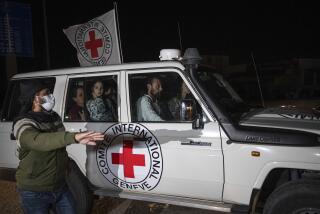Sadr Fighters Begin Giving Up Arms
BAGHDAD — Members of cleric Muqtada Sadr’s Al Mahdi militia began turning over weapons to Iraqi authorities here Monday as the first step in a fledgling peace agreement designed to end weeks of deadly clashes in the capital.
Loyalists of the Shiite Muslim cleric gathered at three police stations in the capital’s Sadr City neighborhood to turn over weaponry. The program, scheduled to run through Friday, offers payments ranging from $11 for a mortar round to $1,000 for a heavy machine gun.
Authorities did not immediately release full figures on the day’s cache. But at the Habibiya police station, an Iraqi national guard officer reported that militants arriving there turned over 80 rocket-propelled grenades, more than 30 mortar rounds, 20 heavy machine guns, land mines and explosives.
“The people of Sadr City revealed their true good intentions today, and the money we are giving them only represents a gift of consideration to the people,” said the officer, who identified himself only as Maj. Yehia.
Kareem Shamaisem, a 42-year-old owner of a window glass store who turned over two sniper rifles for $630 each, said, “I follow the laws and rules of the marjaiyah [the Shiite religious elite] and the orders of Muqtada al Sadr, so I gave up these weapons.”
Islamic militants, meanwhile, posted a videotape on an Internet site Monday that appeared to show the beheading of two hostages, identified as a Turkish contractor and an Iraqi Kurd translator.
And in the northern city of Mosul, a car bombing killed a U.S. soldier and two Iraqi civilians.
With the buyback program, an Interior Ministry official expressed “cautious optimism” for the prospect of a lasting peace with Sadr’s forces, who staged uprisings in April and August. The latter revolt ended with the withdrawal of the Al Mahdi fighters from the southern city of Najaf after a three-week siege, with many of the militants migrating to Sadr City.
Interim Prime Minister Iyad Allawi warned that the government remained ready to crack down if Sadr didn’t live up to the terms of the weekend peace agreement.
“We hope things will work out. If it doesn’t, we will have to do whatever is necessary for the rule of law to prevail,” he said Monday during a visit to the city of Samarra, a northern Sunni Muslim hot spot that was recently retaken by U.S. and Iraqi troops.
The weapons turnover came amid signs of relative calm in Sadr City, which has seen almost nightly clashes and U.S. airstrikes in recent weeks. Police and Iraqi national guardsmen fanned out through the district, controlling traffic and blocking vehicle access to the drop-off points. U.S. tanks and armored vehicles also patrolled the streets.
“Hopefully things will be back to normal in this city,” resident and Sadr loyalist Majeed Hassan said.
The night before, Sadr representatives had ordered militia fighters to remove the roadside bombs that litter the district’s streets, Hassan said.
The agreement, if it holds, should smooth Sadr’s entry into the developing Iraqi political process.
The cleric, believed to be about 30, has offered mixed signals about his willingness to join in the parliamentary elections scheduled for January.
Government officials say they plan to wait for full results before declaring the buyback program a success. Previous cease-fire and disarmament agreements with Sadr have fallen apart amid accusations of bad faith on both sides.
An additional stumbling block could be the refusal of some die-hard Al Mahdi fighters to heed their leader’s call for an end to the conflict.
“I know it’s the first day and things had been quiet, but when Muqtada orders us to fight, we go out and risk our lives for him. Now he orders us to surrender our weapons, so it’s our duty to do so,” Hassan said.
In at least one police station, no money was available, so citizens received a receipt for future payment.
In the Mosul car bombing, which was aimed at a U.S. military convoy, nine American troops were injured in addition to the fatalities. Hospital officials reported that 18 civilians were also wounded. The powerful blast, reportedly from a booby-trapped pickup truck, rattled residents citywide.
Several witnesses said that after the blast, U.S. troops fired at bystanders.
“The occupation forces started shooting randomly on the area, and I was injured by these lunatics,” Subhi Adnan, 45, said from a hospital bed.
A U.S. military statement said the soldiers came under small-arms fire from a local mosque after the attack, but it did not mention whether the troops had fired.
The Internet video released Monday showed men claiming to be members of the Ansar al Sunna Army appearing to behead two men. A separate statement posted on an Islamist website identified the victims as Maher Kemal, a Turkish contractor taken captive on the highway between Mosul and Baghdad on Friday, and Luqman Hussein, an Iraqi Kurd who allegedly worked as a translator for U.S. forces.
The Al Qaeda-linked Ansar al Sunna Army has claimed responsibility for a series of kidnappings and executions, including the Oct. 2 beheading of an Iraqi man and the execution of 12 Nepalese workers in August.
In Hit, about 90 miles west of Baghdad , U.S. Marines engaged in an hourlong firefight with insurgents that left a local mosque on fire.
A U.S. military spokesman said that the attackers took up positions in the mosque and that airstrikes were called in, Reuters news agency reported.
Special correspondent Roaa Ahmed in Mosul contributed to this report.
More to Read
Sign up for Essential California
The most important California stories and recommendations in your inbox every morning.
You may occasionally receive promotional content from the Los Angeles Times.










